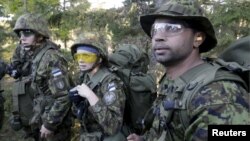Members of Estonia's part-time militia crouch in a sandy trench on a hilltop as machine gun fire echoes through rain washed forest. Russia may be some way off but it is wariness of a vast neighbor that is swelling the force's ranks, drawing laborers and and office workers alike to a grueling exercise.
The Defense League of the Baltic State has grown 10 percent to almost 16,000 soldiers since Russian President Vladimir Putin's annexation of Crimea last year and support for rebels in eastern Ukraine raised security fears in the small NATO nation.
"Young people today want to do their bit for the defense of their country," medic Riho Mannik, 35, said near a dug-in mortar position during the exercise of 700 volunteers, near the village of Pala 160 kms (100 miles) from the Russian border.
Mannik, who works as an ambulance team leader in his normal job, said young people can also learn skills from the military to help "their civilian life and their job prospects."
The Kremlin denies Western charges it fomented rebellion in Russian-speaking eastern Ukraine. But Tallinn fears the Kremlin could incite unrest among Estonia's own ethnic Russian, who account for some 25 percent of the population, concentrated in Tallinn and around Narva near the border.
Its fears are shared by the other Baltic states ruled from Moscow from World War II until 1991 - Lithuania and Latvia.
Weary after a night in early September camping out in the rain in teams of attackers and defenders, an assault on the hilltop starts with simulated 81 mm mortar rounds and bursts of machine gun and small arms fire - all blanks.
Soldiers in camouflage gear run around the forest's hills and gullies and eventually, exercise umpires with blue tags on their uniforms say the attackers have suffered heavy losses and been repulsed.
But they are expected to regroup and hit the dug-in positions again in the exercise, dubbed "Northern Frog."
Apart from worries about Ukraine, many Estonians were angered by the sentencing in Russia last month of an Estonian police officer, Eston Kohver, to 15 years in prison on charges of espionage.
Tallinn say he was illegally abducted at gunpoint from a border crossing in September 2014 by Russians using radio jamming equipment and smoke grenades. Russia says Kohver was on Russian territory.
"The kidnapping ... made communication security and cyber defense even more important parts of our defense," Lieutenant Colonel Marek Laanisto, commander the Viru district of the Defense League, said as soldiers wearing headphones in a light truck tapped away on laptops.
NATO accuses Moscow of stepping up its military air and sea activity in the Nordic region. But Moscow denies any aggression and argues that the Western alliance has adopted a threatening posture towards Russia by incorporating the Baltic states into NATO after the collapse of the Soviet Union.
Surge
In the first half of this year, the number of soldiers in the Defense League, under the command of the Estonian Ministry of Defense and military HQ, rose by 504 to 15,577.
Numbers surged by 935 in 2014, almost all after Russia's annexation of Crimea in March. By contrast, just 324 people joined in all of 2013.
With an aging, declining population of just 1.3 million, the regular Estonian defense forces have around 3,200 professional personnel. Estonia is one of few NATO nations to spend a NATO goal of two percent of gross domestic product on defense.
The smallest of the three Baltic countries, Estonia has maintained conscription for men over 18 since independence from the former Soviet Union in 1991, so it has a reserve of 60,000 who have completed basic military training.
Many in the Defense League - aged from 18 with no upper limit although all have to pass a fitness test - volunteer their weekends and week nights for training and attending yearly exercises like Northern Frog.
An emergency force, it can also be used to help in civil emergencies such as floods.
On a nearby hill, Sergeant 1st Class Taavi Saimre, who signed up this spring and is a member of the cyber defense unit, listens to the radio chatter.
"I was also influenced to join by the events in Ukraine," said Saimre, 41.





